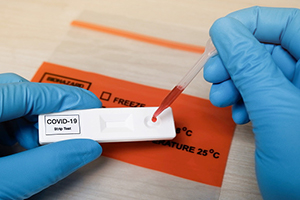Results from an analysis involving both patients with cancer and health-care workers at Centre Léon Bérard in Lyon, France, showed that patients with cancer had a significantly lower detection rate of SARS-CoV-2 antibodies 15 days or more after COVID-19 symptoms and a positive reverse transcription polymerase chain reaction (RT-PCR) test than health-care workers. These findings were published in a prepress article by Solodky et al in Annals of Oncology.

Photo credit: Getty
Study Details
The Centre Léon Bérard study team retrospectively analyzed patients with cancer who presented with suspected COVID-19 from March 1, 2020, to April 16, 2020, and who were enrolled in the Oncovid-19 clinical trial (approved by an Institutional Review Board on March 12, 2020), and a series of health-care workers who underwent voluntary testing in their center.
In total, 85 patients with cancer were tested both with SARS-nCoV-2 RT-PCR on nasopharyngeal samples and a point-of-care antibody diagnostic test called Toda Coronadiag. Coronadiag is a rapid, lateral-flow immunoassay that provides results in 10 minutes by using a finger-pricked blood sample. Coronadiag was performed 15 days or more after RT-PCR–positive test or COVID-19 symptoms. The Coronadiag test was performed on 244 nurses and doctors. SARS-CoV-2 RT-PCR was found positive previously in 14 health-care workers who presented with clinical symptoms and was performed in the 3 health-care workers who tested positive for SARS-CoV-2 antibodies.
Results
The analysis showed that 5 of 85 patients with cancer (5.9%) and 13 of 244 health-care workers (5.4%) had detectable antibodies against COVID-19. However, the antibodies were more often undetectable in patients who received anticancer treatment in the month prior to testing.
In total, 10 of 85 patients with cancer (12%) had documented SARS-CoV-2 by RT-PCR, and 5 patients (6%) had a positive antibody detection test. Three of the 10 patients (30%) with infection confirmed by RT-PCR had detectable antibodies 15 days after the clinical start of the infection. Two of the 75 remaining patients with cancer (2.3%) screened negative by RT-PCR had detectable SARS-CoV-2 IgG.
All 244 health-care workers were tested with the Coronadiag test, including 14 with COVID-19 confirmed by RT-PCR. Ten of these 14 healthcare workers (71%) with RT-PCR–documented infection had detectable antibodies 15 days or later after clinical symptoms. Three of the remaining 230 healthcare workers (1.3%) had detectable antibodies, but at the same time, had a negative RT-PCR test. Two of them reported suspected COVID-19 symptoms in the previous weeks.
The study team found that the rate of seroconversion 15 days after SARS-CoV-2 infection confirmed by RT-PCR was significantly lower in patients with cancer than in health-care workers (30% vs 71%, P = .04).
Furthermore, the study team reported that six of the seven serodiagnostic-negative patients with cancer received cytotoxic therapy or underwent major surgical intervention in the previous 4 weeks, compared to none of the five remaining patients (P = .003). None of these patients died.
The authors concluded that in their series, patients with cancer had a significantly lower detection rate of SARS-CoV-2 antibodies 15 days or more after symptoms of COVID-19 and RT-PCR–positive test. Antibodies were more often undetectable in patients who received anticancer treatment in the month prior to testing. They emphasized that additional studies are needed to confirm whether immune response to the virus is influenced by recent treatment for cancer.
Disclosure: The study was funded by NetSARC and RREPS, RESOS and LYRICAN, Association DAM’s, Eurosarc, la Fondation ARC, Infosarcome, InterSARC, LabEx DEvweCAN, PIA Institut Convergence Francois Rabelais PLAsCAN, Ligue de L’Ain contre le Cancer, La Ligue contre le Cancer, and EURACAN. For full disclosures of the study authors, visit annalsofoncology.org.

